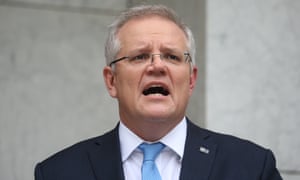The social distancing strategy that the Australian state and Commonwealth Governments have determined we should all suffer in order to fight the Wuhan Virus is considered by experts to be a "low cost" alternative. As explained in the Medical Journal of Australia:
China appears to have constrained transmission of COVID-19 outside of Hubei Provence through rapid and intensive containment and mitigation interventions. Most countries only attempt social distancing and hygiene interventions when widespread transmission is apparent. This gives the virus many weeks to spread with a higher basic reproduction number (R0) than if they were in place before transmission was detected or widespread. Pre-emptive, low cost, hygiene enhancement and social distancing in the context of imminent community transmission of novel coronavirus COVID-19 should be considered. Early interventions to reduce the average frequency and intensity of exposure to the virus might reduce infection risk, reduce the average viral infectious dose of those exposed, and result in less severe cases who are less infectious. A pre-emptive phase would also assist government, workplaces, schools, and businesses to prepare for a more stringent phase. Countries, and subregions of countries, without recognised COVID-19 transmission should assume it is present and consider implementation of low cost enhanced hygiene and social distancing measures.
The above is the abstract from the article Pre-emptive low cost social distancing and enhanced hygiene implemented before local COVID-19 transmission could decrease the number and severity of cases by Craig B Dalton, Stephen J Corbett and Anthea L Katelaris published in Medical Journal Australia (published online on 18 March 2020.
The only significant costs the experts foresee is a loss of productivity from a work at home policy:
The suite of low cost pre-emptive interventions, other than a working from home policy, is unlikely to affect work productivity and may provide the community with some reassurance that all is being done to prevent the epidemic. Some may see it as an over-reach but thus far communities seem to accept or voluntarily adopt low cost interventions and acceptance may be enhanced through consultation and trust building.
Social distancing is recommended by the WHO, which is predictably silent on the matter of cost, but insists that it needs to "better educate" governments about their benefits:
Nonpharmaceutical interventions
Nonpharmaceutical interventions (NPIs), also known as community mitigation strategies, are a critical tool for limiting the transmission and spread of influenza, allowing people to better protect themselves and others, and they are the first line of defence against influenza in all countries. NPIs are the most readily available set of interventions; they can be on the personal level (e.g. better hand washing or the use of facemasks) or on the community level (e.g. social distancing in schools, workplaces and events). During the 1918 pandemic, NPIs were the only available set of interventions; modern research on 1918 mortality data and experience with NPI implementation has provided historic evidence on the effectiveness of early, layered NPI implementation, even in the context of a severe and highly transmissible pandemic (43). Since the 2009 pandemic, a number of countries have fully integrated NPIs into their national influenza pandemic preparedness plans or published NPI guidelines. Additionally, there have been more contemporary studies to assess the effectiveness of NPIs. However, more attention is needed to better educate policy-makers about the benefits of NPIs and their role in national influenza prevention and control strategies.
(Global influenza strategy 2019-2030ISBN 978-92-4-151532-0)
It seems that "anything it takes" Morrison may not have understood that the "best in the world" medical advice he received with regards the Wuhan Virus is based on the assumption that the mitigation strategies are assumed to be "low cost".
END

No comments:
Post a Comment